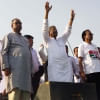Teesta deal finalised
The Teesta water-sharing treaty between Bangladesh and India is going to be signed soon as the agreement has been finalised, according to a government adviser.
“We are confident that it will be signed soon. The agreement is ready. The ball is on India's court now,” said Gowher Rizvi, international affairs adviser to Prime Minister Sheikh Hasina.
He was speaking at a panel discussion on connectivity on the last day of a two-day Bangladesh-India Friendship Dialogue held at a city hotel yesterday.
The Friends of Bangladesh organised the two-day event in association with the foreign ministry of Bangladesh and the India Foundation.
Politicians, academics, think-tanks, former diplomats and senior journalists of both the countries attended the seventh edition of the dialogue.
The Teesta treaty was drafted in 2010 and was supposed to be signed by the two countries in early September 2011.
But it was shelved at the eleventh hour in the face of opposition from West Bengal Chief Minister Mamata Banerjee.
Speaking at another session, Prof Mustafizur Rahman, executive director of the Centre for Policy Dialogue (CPD), emphasised basin-wise water management.
He said both the countries had waited 40 years for getting the Land Boundary Agreement settled. “But we cannot afford another 40 years to solve the water-sharing issues,” he said, arguing that water is directly related to food insecurity and migration.
Earlier in the day, speakers at a panel discussion on security urged the South Asian countries to be serious about fighting terrorism.
Foreign Secretary Md Shahidul Haque dubbed the current Indo-Bangla relations to be at its best and a model of bilateral ties in the region.
“Grid connectivity and bandwidth sharing seemed unimaginable a decade ago, but it has become a reality now,” he said.
The foreign secretary said there are still some unresolved issues, which can be settled, adding that water-sharing of all common rivers holds the key to further cooperation.
He proposed that the two countries explore opportunities in the areas of blue economy, renewable and nuclear energy and space and satellite.
MJ Akbar, national spokesperson of India's ruling Bharatiya Janata Party, who was chairing the session, said what was once unachievable and unthinkable in the Indo-Bangla relations has become achievable.
He said security is the key to peace on both sides of the border.
“Security only comes when there is confidence,” he said, adding that there is a problem of psychological insecurity between India and Bangladesh.
Both Akbar and Prof Syed Manzoorul Islam of English at Dhaka University said nations have to be honest in their cooperation in case of counter-terrorism.
“If the state actors give leap services, nothing can be achieved,” said Prof Manzoorul Islam.
Abdur Rashid, executive director of Dhaka-based Institute of Conflict, Law and Development Studies, called for bringing all countries on board to counter radicalisation.
He put emphasis on social inclusion, non-immunity for hate preachers, uniform education, bringing all sorts of madrasas under one regulator and incorporating Islamic scholars and imams in the fights against terrorism.
Sripriya Ranganathan, joint secretary of the external affairs ministry of India, said the two neighbouring countries could go a long way in exploring potentials of the blue economy following settlement of disputes over maritime boundary.
Alok Bansal, a director of the India Foundation, a think-tank, said the two countries could go for healthy border management now following the resolutions of disputes over land boundary and maritime boundary.
He added both the countries are the largest contributors of peacekeeping forces to the United Nations. “In the future the two countries may need to work together to maintain regional peace.”
Swapan Dasgupta, a senior journalist of India, gave an example of deepening relations between India and Bangladesh.
He said the Land Boundary Agreement was passed in the Indian parliament unanimously although very few bills are passed in the assembly without any opposition.
He further said there is a tendency in India to view Bangladesh in the prism of West Bengal. “But it is suicidal because Bangladesh is a sovereign country although there might be cultural affinity between Bangladesh and West Bengal.”
Dasgupta added a big opportunity is now there to enhance the Indo-Bangla relations.
“We have to seize this opportunity. Big opportunities come rarely in the history,” he observed.

 For all latest news, follow The Daily Star's Google News channel.
For all latest news, follow The Daily Star's Google News channel. 








Comments